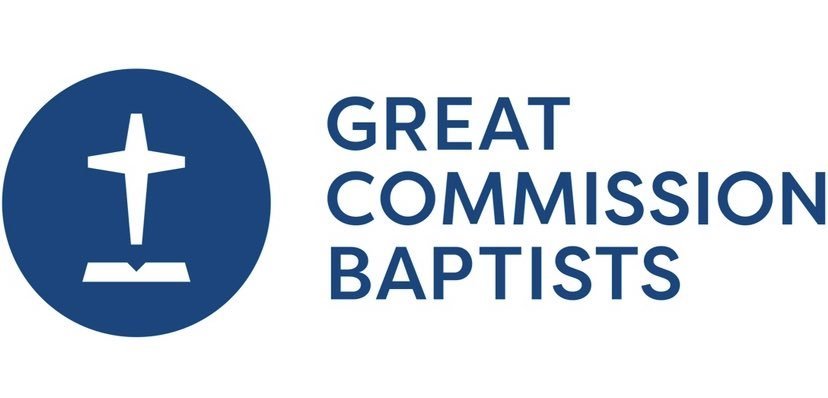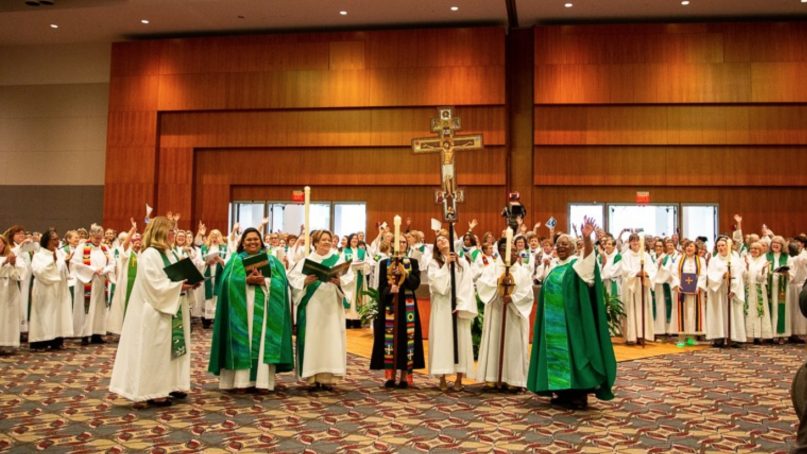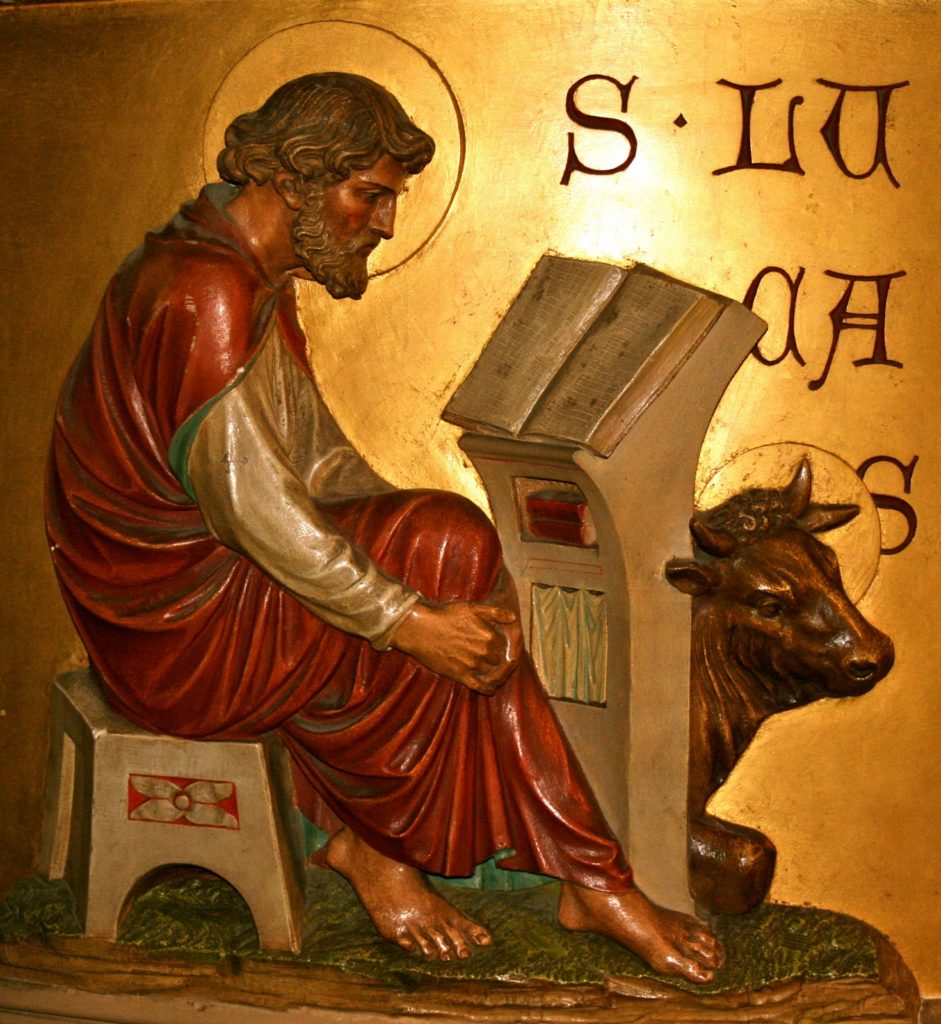A repeat from the past written by Paul McCain now almost 20 years ago.
The movie “Luther” [2003] sparked renewed interest in the life and work of Martin Luther. The fact that Concordia Publishing House’s movie companion book, Luther: Biography of a Reformer was received so enthusiastically indicates that, if only given a chance, people are eager to learn about Martin Luther and what it means to be and remain genuinely Lutheran. There seem to be three types of responses to the question, “Does being Lutheran matter?” One is, “Are you kidding me? You better believe that it matters! Let me tell you why!” Another response is a sort of “mental shrug” to the question, “Well, of course we want to be and remain Lutheran, that goes without saying, there’s no real need to talk much about it though.” And then, sadly, there is this response, “It doesn’t matter. All that matters is being a Christian. We need to focus on what unites us rather than what divides us.” As I watch and analyze events and trends in Christianity and Lutheranism, both in this country and around the world, I am more convinced than ever before of two things. First, being and remaining genuinely Lutheran matters more then ever, and second, the reasons why this is so are unclear at best to many people.
To be Lutheran is to be a person who says, “This is what God’s Word, the Bible, teaches. This and nothing else is true and correct. This understanding and teaching and confession of the Gospel of Jesus Christ is the most accurate and most faithful to God’s Word. This and none other. Nothing more, and nothing less, will do, for this is the truth.” In our day and age these sorts of bold assertions are often met with angry responses, such as, “How dare you insist that Lutheranism is actually the true teaching of God’s Word. How can you think you have the truth? All that matters is if a person is sincere about their faith in God.” We live in a time when truth is viewed as something relative, impossible to know for sure. The attitude common today is reflected when we hear things like this, “I have my truth. You have your truth. As long as we respect our differences, that is all that matters.” It seems today that the most important “truth” for many people is their profound doubt that truth can be known, and equally strong conviction that those who claim to know the truth are wrong.
Before we go further we need to clear up a common misconception. While insisting on the truth of Lutheranism, we can never allow ourselves to do so in an arrogant, haughty or self-righteous manner. People who are passionate about the truth of Biblical Lutheranism know that the Bible teaches often and clearly that we are all sinful human beings in need of God’s constant mercy, which He so lavishly gives in Christ. To be truly Lutheran is to receive the gifts of God with humility, repentantly recognizing our great need. It is tempting for Lutherans to be proud and arrogant of their great heritage, but this is a terrible evil! To be Lutheran is to be always mindful of our great sin and our great need for a Savior. To be a Lutheran is to be a sinner calling out to fellow sinners, “Come and see!” Furthermore, we would never want anyone to think that we Lutherans are saying, “We, and we alone, are the only ones who will be in heaven. In fact, you can’t be a Christian unless you are a Lutheran.” Not so! Not at all. We realize that the Word of God is powerful and active, wherever and whenever it is heard, read or meditated on. There are many Christians in other denominations and churches. They are not Christians because of the errors in their churches, but in spite of those errors. Let’s then have none say, “You Lutherans think you alone are Christians.” We have never said that, we have never believed it, and we never will. The reason we insist on Lutheranism for everyone who will listen is we believe so passionately that it truly is the most correct and most accurate understanding of the Word of God.
Another point that confuses many people is the fact that there are so many different churches to choose from. It is an awful mess, so it seems. Yes, it can be confusing, but it really is not as complicated as some would think, or want to maintain. Up until the year 1054 there was basically one unified Christian church, distinct from a number of non-Christian or anti-Christian heretical groups. In 1054 the church divided into Eastern and Western Christianity. So, you have to decide if the Western tradition was correct, or the Eastern tradition. By the time of the late Middle Ages the Western Church, which had come to be known as the Roman Catholic Church, had reached a point of deep corruption, most importantly in what it believed, but also in the morals and life of the clergy and church leadership. In 1517 there began what we know today as the Reformation, when Martin Luther, a professor and monk in Wittenberg, Germany posted a series of “talking points” on the practice of selling “indulgences” by which people were led to believe they could buy forgiveness of sins, for their dead relatives in purgatory. A person has to decide if the Lutheran view of Christianity is correct, or the Roman Catholic view is correct. After the Reformation, many groups developed from the teachings of persons other than Martin Luther, most notably, two men: Ulrich Zwingli and John Calvin, who did much of his work in Geneva. These two men and their writings gave rise to many churches that can be traced back to and grouped under the general category of “Reformed” churches. In America in the 19th and 20th century there arose many splinter groups from Reformed churches, these would include “Charismatic” and “Pentecostal” groups, along with groups that rejected all denominations and became, in effect, a denomination of their own, the so-called “non-denominational” churches. And so the question then becomes, “Is Lutheran theology correct, or Reformed theology correct?” So, is it Rome or Wittenberg. If Wittenberg, then is it Geneva or Wittenberg?” Once those decisions are made, the myriad of denominations today makes a lot more sense.
But there is an additional challenge unique to our century and more so the past half-century. Today, despite all their denominational differences and historic confessions, the vast majority of Christian churches in Protestantism have been nearly overwhelmed by the rise of liberal Christianity. This unites them more so than any other feature of their confession of faith. Historic differences are no longer regarded as divisive since these divisions were based on one group’s understanding of the Biblical text as opposed to another group’s understanding of the Bible. For example, the difference between Lutheran and Reformed views of the Lord’s Supper are very important and based on very serious and clear differences in how the words Jesus spoke at the Last Supper are understood. Liberalism however regards the words of Jesus in the Bible as unreliable. It teaches that we can not be sure that what is recorded in the Bible is true and accurate, therefore, there is no point in being “dogmatic” about much of anything having to do with the Bible. Modern liberalism has swept through all Christian denominations, Lutheran Reformed, Protestant and Roman Catholic.
This impacts our question, “Does being Lutheran matter?” for we have to realize that there are many churches in the world today that claim to be Lutheran but have been nearly entirely overcome by liberal views of the Bible. Therefore, they have compromised away the distinct doctrinal position of Lutheranism. They are, in other words, Lutheran really in name only, more by way of tradition than by any real living doctrinal distinctiveness. They may still be fond of historic Lutheranism, but no longer insist that it, and it alone, is true and that other views of the Bible are in error. When we ask the question, “Does being Lutheran matter?” It is a question that must be asked first of those who still use the name Lutheran, but no longer insist on the exclusive truth claims of historic, genuine, authentic Lutheranism. Let’s examine the world’s largest Lutheran organization, the Lutheran World Federation. Clear-headed analysis of what is happening in world Lutheranism reveals that the greatest threat to being and remaining genuinely Lutheran comes from groups that call themselves Lutheran! Let’s think about the Lutheran World Federation, for instance. No organization in the world has done more in the past fifty years to deconstruct genuine Lutheranism than the Lutheran World Federation.
It has tolerated, even encouraged, a loose and unfaithful understanding of the Holy Scriptures and the Lutheran Confessions, all the while ostensibly claiming a certain identity with them. The predecessor bodies that formed the Lutheran World Federation would not reject and throw out false teachers such as Rudolph Bultmann who worked to “demythologize” the New Testament, casting doubt on the words and deeds of Jesus. To this day the Lutheran World Federation pays mere lip service to the ancient Christian creeds, but tolerates in its midst churches whose pastors and theologians doubt, and even very brazenly and openly deny the most fundamental tenets of the Christian faith, casting doubt on the miracles of Jesus, His virgin birth, His bodily resurrection, and so forth! LWF member organizations have embraced the anti-Apostolic and anti-Scriptural practice of the ordination of women, abortion. The large Lutheran state churches are offering same-sex marriages. The LWF, despite its claim that it is Lutheran, does not even insist on absolutely faithfulness to the most basic of all the Lutheran confessions, Martin Luther’s Small Catechism. The LWF, and most of its member churches, compromised and walked away from the Lutheran insistence on the Lord’s Supper when it entered into all manners of “full communion” with Reformed churches that continue to this day to deny that the bread and wine in the Holy Communion are in fact the body and blood of Christ. The LWF leadership structure has embraced a compromise of the very heart of the Gospel itself with Rome, when it accepted the “Joint Declaration on the Doctrine of Justification” in which it allowed Rome to continue its formal anathema of the Biblical doctrine that we are saved by grace alone, through faith alone, apart from any works.
In our own country, we have seen the devastating consequences of this compromising view of Lutheranism in the Evangelical Lutheran Church in America. It is in full communion fellowship with the most outrageously liberal of one of the most outrageously liberal protestant churches in the world, the United Church of Christ. The UCC does not even insist that its member pastors confess the Holy Trinity! The disaster taking place in the Episcopalian Church in this nation merely is a portend for what the ELCA faces, which only recently had a prominent woman theologian officiate at a homosexual “wedding” service with two women and then shortly after a pastor in their midst do the same for a male couple. Because of the “Concordat” of full communion the ELCA has with the Episcopalian Church USA the newly consecrated homosexual bishop is now, de facto, also a bishop received and recognized by the ELCA. Within our own Synod there is the constant temptation on the part of some to bury their head in the sand and hope and pretend these situations are not taking place or that somehow, perhaps by magic, they will just all go away or that we can ignore these realities and go on with business as usual. These pressures and theological trends also are at work in our own Synod.
Does being Lutheran matter? Many would suggest that to insist on being and remaining Lutheran is to insist on what divides us from other Christians rather than on what unites us with them. “I’m more interested in people being Christian, rather than Lutheran” is a comment one actually hears these days quite often, sadly and tragically, even from Lutheran pastors. Clearly this is a false alternative that we must be on our guard to avoid. Being Lutheran is not a matter of culture, tradition or habit, at least is should not be simply that. No, being Lutheran is about being passionate about the truth, the full truth, and nothing but the truth as revealed by God in Holy Scripture. As much as we care about the truth of God’s Holy Word and the proclamation of a pure and unadulterated exposition of the Scriptures, being Lutheran matters. Martin Luther was concerned that people would be using his name, but then he realized that using the name “Lutheran” was a way to identify with what he stood for, to identify with his confession of the Gospel, in other words, to clearly identify oneself as a person who holds to a specific confession of Christ and none other. There are so many competing points of view of what Christianity is. Being Lutheran therefore is a way to distinguish and teach and confess and bear witness to the Christian faith in a very specific and faithful way.
Being and remaining truly Lutheran takes courage and determination. It is not easy. Faithfulness to the Word of God is never easy, or convenient, or popular. This places unique demands on our pastors and congregations and our church body, since we are determined to be and remain truly Lutheran. Dr. C.F.W. Walther, the first president of The Lutheran Church-Missouri Synod, offers important insight in his masterful study of Lutheranism titled The True Visible Church on Earth. Contrary to our detractors, the Lutheran Church has never claimed to be the only church outside of which there is no salvation. No, not at all. We do believe that the teachings of the confessions of the Evangelical Lutheran Church, the Book of Concord of 1580, are in fact the pure, divine truth, because they agree with the written Word of God on all points. It is for this reason that the Lutheran church, and consequently our Synod, demands of all members, especially of our ministers, that they acknowledge the Lutheran Confessions without reservation and show their willingness to be obligated to them. And it is precisely because we so value and honor the purity of the Gospel given as a gift to us that we stand with Scripture (1 Cor. 1:10; Rom. 16:17) and our Confessions (AC VII; FC SD X) in rejecting every fraternal and ecclesiastical fellowship that rejects the truth of the Lutheran Confessions, either in whole or in part.
This is why we say that being and remaining Lutheran does matter. We Lutherans therefore have no choice but to sound the call for true, orthodox, confessional Lutheranism. We want no poor imitations, but the real thing. We will continue to call for complete faithfulness to God’s Word and the Lutheran Confessions, recognizing the blessing that such faithfulness has been since the time of the Lutheran Reformation. Our desire is always to be maximally faithful, not merely minimally so.With this call for faithfulness comes the Lord’s call for outreach. In no way must we ever permit ourselves to pit faithfulness against outreach. Faithfulness to the Word results in outreach with the Gospel.
Faithful outreach is based entirely on a faithful proclamation of the Word. The constant hallmark of a genuinely Lutheran Synod, and a genuinely Lutheran congregation, is this two-fold emphasis: faithfulness to Scripture and the Confessions, and outreach with the Gospel. God forbid that we would ever apologize for wanting to be, and remain, a truly Lutheran church, or that we would ever hesitate clearly to speak up when we notice others walking away from the truths of the Word and the Lutheran Confessions for the sake of unity, which is no unity at all, since it is not based on agreement in the teachings of the Word, but only on an agreement to disagree! Thus, we pray that the Lord would continue to strengthen and embolden us to be a true, faithful and courageous Lutheran church body, to the glory of His holy name and the extension of His kingdom.
It is particularly interesting to me how many younger are keenly interested in Lutheranism. They want substance in worship and in Bible study and in every aspect of their church life. They want “authenticity,” not the showy and manipulative “hype and hoopla” that their parents and maybe now even grandparents found so alluring in past several decades. They have been raised in a culture that at every turn is trying to manipulate them into buying something. They have had enough of that. They see how shallow it is and they want instead substance and content and rich depth of meaning. This is where Lutheranism excels, for we rejoice in the depths of God’s truths, not resting content with simply “once over lightly.”
We wonder why, when people have a choice, they leave the Lutheran church. Why bother to remain Lutheran if there is nothing anything worth remaining for? If the differences that distinguish Lutheran from any other option in Christendom are never mentioned, or made to appear no more important than picking amongst various ice cream flavors, is it any wonder why people leave our congregations to find “greener pastures” in other churches? That is why the constant challenge we face is gently, pastorally, warmly and winsomely to be working hard at reinforcing good understandings and encouraging careful thinking and reflection, helping our people to see the issues of our day, and thereby recognizing and appreciating the fact that Lutheranism is the best option for anyone who wants to remain genuinely faithful to God’s Word.
So, how does one remain Lutheran? Fond hopes, fervent wishes, pious prayer. Yes, all that, but more. The old Benedictine motto: “Ora et labora” applies! Pray and work and then, pray and work some more. Teaching is key. We must disciple people into the truth. This involves long, hard work. Passion, energy, excitement, dedication, enthusiastic desire to pass along the truth-these are key to being and remaining Lutheran. Nothing is more exciting than the truth, and if that is so, shouldn’t our attitude toward it be equally one of excitement and energy and conviction? If Lutheranism appears to be dreary, dull and plodding whose fault is that but ours? High-quality intensive teaching is the key to the future of Lutheranism. We sing, “Lord, keep us steadfast in Your Word” and then we work to make it so among us, for our sake and for the sake of those who will come after us.
Does being Lutheran matter? Yes, it matters. It matters as much as being and remaining true to Christ and His Word and Sacraments matters, as outreach with the Gospel matters, and as loving our neighbor matters. Our great privilege is helping all those whom we can, be and remain genuinely Lutheran, for that is to be nothing more, and nothing less, than true to Christ and His Gospel. To that end, may God bless our efforts, and may He guide our work together in this high calling and noble task-being and remaining Lutheran.















